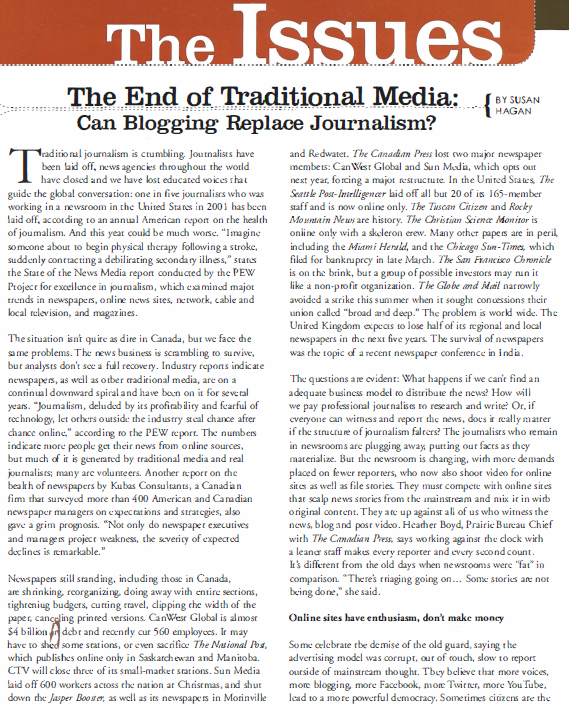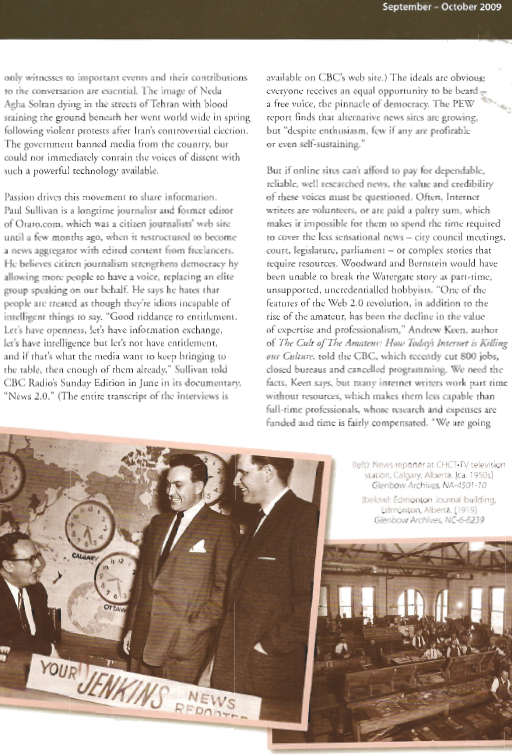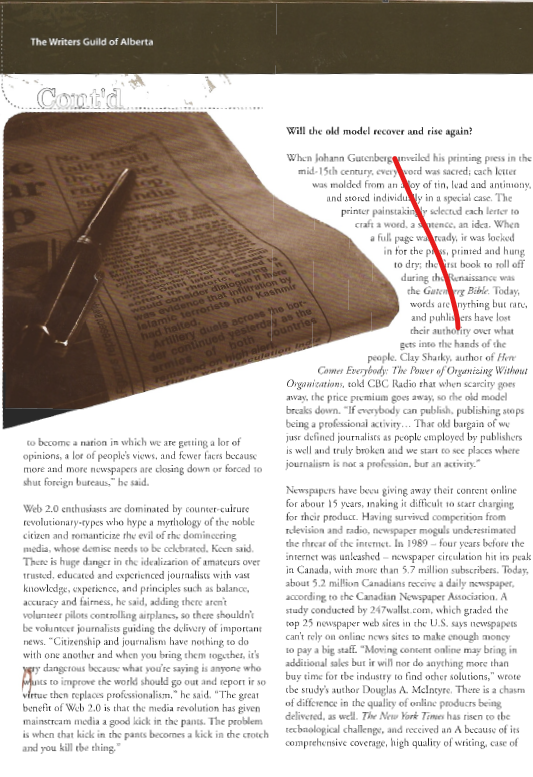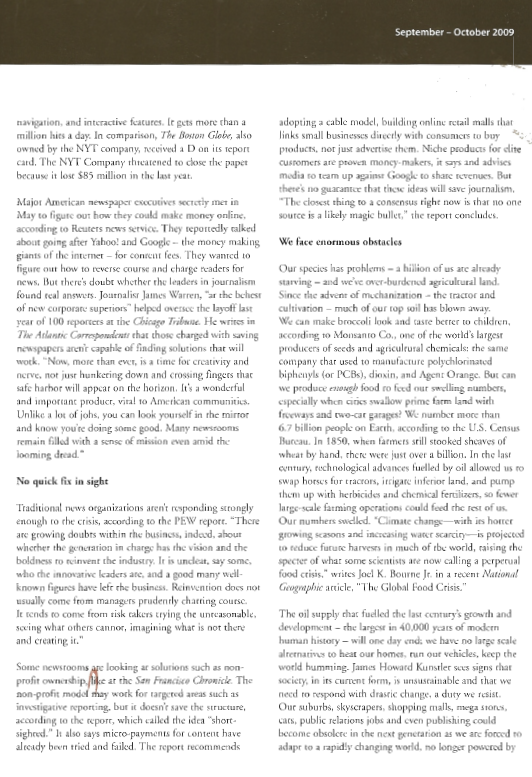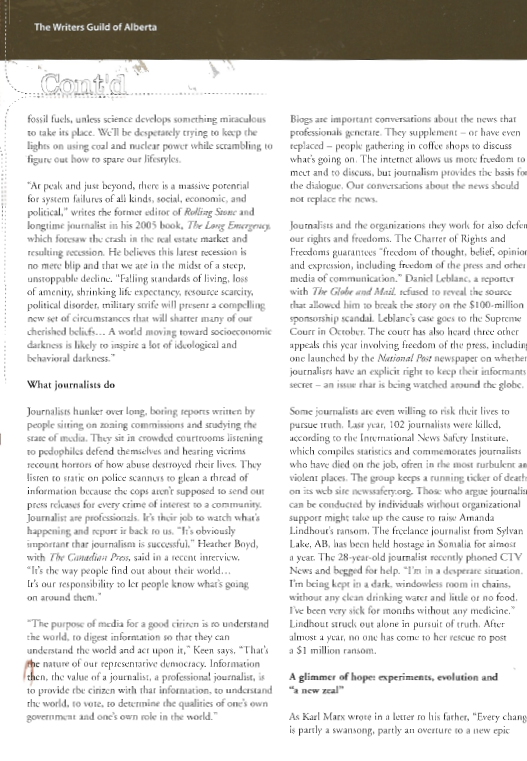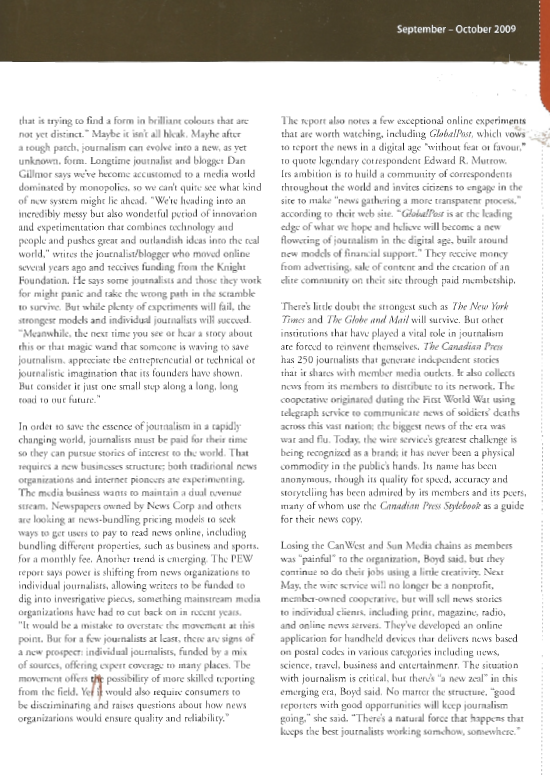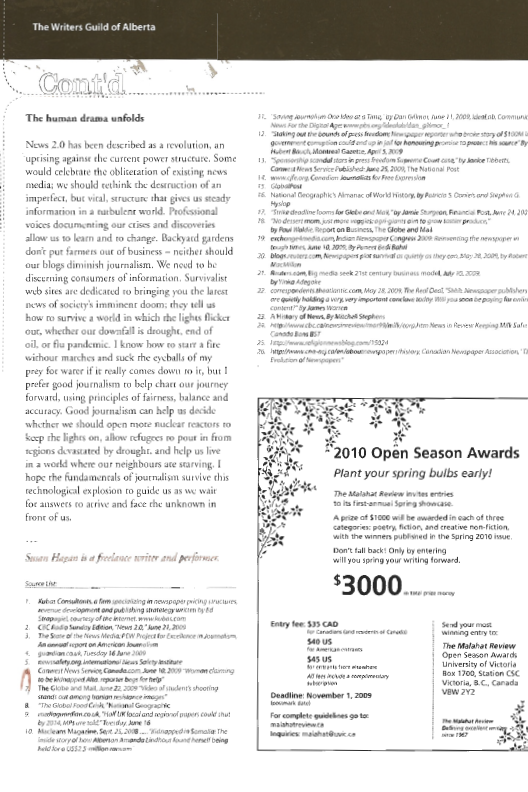Will the novel survive the digital age?
Aldous Huxley imagined a Brave New World where people were kept incessantly occupied and drugged to keep them from feeling and going mad. Science was used, not to discover, but to control. Their entertainment was dazzling. “The feelies” were movies that gave them not only sight and sound, but also smell and touch. When a couple made love on screen, the audience felt every sensation, right down to the fur of the bear skin rug. But the entertainment was empty, offering no real meaning—just pleasure and distraction so they didn’t have to think or feel.
This story of an imagined future makes you wonder about the Future of Story: The topic of a conference hosted by Grant MacEwan’s Centre for Arts and Communication. Though it seems unfathomable to literature lovers that the book could become extinct, all of our traditional narrative forms are in question because of rapidly evolving technology, which changes the way we read and even how our own brains function. As billions of neurons in our brains rewire to cram in the infinite bites of information now available to us, we may lose the ability to concentrate long enough to read a story—never mind write a great work of art. Many people confess their brains and their memories are already affected by the onslaught of information, forcing cultural phenomenon such as email vacations and cell phone sabbaticals.
Nicholas Carr argues in his 2008 essay “Is Google Making Us Stupid?” that the Internet gives us snippets of information, scattering our attention and dampening our concentration with blinking ads, digital “gewgaws” and hyperlinks which surf us to endless possibilities. “In Google’s world… there is little place for the fuzziness of contemplation. Ambiguity is not an opening for insight, but a bug to be fixed,” he writes in Atlantic magazine. The printing press made way for the modern novel, but the advent of infinite bites of information could obliterate our desire and ability to read or create them.
Could the Internet destroy the novel?
At present, there are more books published than can possibly be widely read. Richard Helm, editor of the Edmonton Journal’s book section and moderator of the Future of the Book panel, receives up to 100 books every week to review—only a few are chosen and thousands are ignored. “There are still plenty of books being published,” he said, though they most go no further than the slush pile. “I see some future for the book.”
But he also imagines a day when fewer books will be published as the Internet swallows all of our information and absorbs every facet of our media. Newspapers, themselves, are deeply affected. The Internet is forcing newspapers to reinvent themselves online or face becoming obsolete: many newspapers have closed or gone online only with far fewer journalists telling stories. Newspaper stories have become shorter and snappier. Even The New York Times has changed some of its pages to have more of a quick hit feel. It’s not so radical to think the novel in its current form could be at risk.
Just as digital music has meant the closure of music stores, bookstores are similarly threatened: The January launch of Apple’s Tablet I-Pad challenges the entire way we perceive our reading resources. The technology giant has struck deals with books, magazines and news publishers to provide readers with instant access to unlimited materials without felling a single tree. Many wonder whether the novel will change as a result and whether quality will suffer.
Panelist Laurie Greenwood can’t imagine life without real books. She prefers the smell, texture, and tactile experience of a book—she has a huge personal collection, including signed first editions. But the owner of Greenwood’s Bookstore, in her 50s, admits change is inevitable and we are in a time of rapid transformation. Her generation will be replaced by people who don’t have romantic attachments to paper. There would be nothing tangible to hand down without hard copies. “I think there will always be a combination of both, but bookstores will cater to a niche market,” she told dozens of writers, students and industry professionals who gathered to learn and to listen. “I’m not completely sure how we adapt.”
Another speaker, Robyn Read is the publisher for Freehand Books, a new small literary press based in Calgary that publishes up to six titles a year. “Old media have no choice but to play by new media rules,” she said. Though Read is from the tech savvy generation, she worries writers will change the way they write, catering to the online world rather than to the flow of narrative. The art of publishing could be lost—the design, the typeface, and even the pacing of chapters within the book. E-books offer features such as a bar at the bottom showing how far along you have read, and how long a section will take an average reader to get through. These features could decrease the intimacy people share with a book and encourage skimming, sampling and abandoning, she said, as people’s brains become more fragmented.
Isn’t there a positive side to all of this? Aren’t you just focusing on the romantic, on the negative, on the, frankly, old? a young woman asks from the audience. The hyperlinks provide depth, she argues, instant dictionaries to provide more context, graphics, videos—layers of information. But technology disregards the art of books, said Thomas Trofimuk, an Edmonton novelist and poet, who recently bought Carl Jung’s Red Book—a stunning work of craftsmanship that costs about $150 and is not available as an E-book. “I think the book is the superior medium,” he said. “But our attention spans are getting shorter.”
What would replace traditional stories and whose stories will be told?
Colby Cosh, blogger for Maclean’s, embraces the new world order and rejects those who cling to older forms: “The term journalist should become extinct,” he said, during the panel discussion on The Next New Journalism. The Internet universe allows everyone to participate in the conversation about our world and does not limit it to a few elite individuals. “That class of accredited or entitled journalist is not going to exist in the future… It leaves us with something new.” A creative class, a collective truth, wisdom that is greater than any individual expert, he said.
Karen Unland, editor with edmontonjournal.com, said there is great value to stories told by citizens and that newspapers have a lot of work to do to bring layers of news to younger audiences. But, she said, there is a real need for professionals to be paid to cover the stories of our world. “Part of our craft is the story telling. It’s talking to people,” she said, adding the technology allows a journalist to research faster and get away from the desk and out into the world to talk to people. “We can concentrate on the stories that are there.” Plus, she said, online newspapers are learning to deliver a richer experience with videos, links and depth—although they are still figuring out how to make money in the online world.
Mack Male, an Edmonton blogger and new media expert, said we need to embrace change, not fear the unknown. He said the people who follow his blogs aren’t an audience, but are participants as events unfold: “It helps raise the bar for storytelling,” he said. “We have pictures, videos, tweets and research” from many voices, not just one.
What stories do we want to hear? Do we need explosions to pay attention?
The news pummels us with the hard realities of our world: natural disasters, violent crimes, starving people and political upheaval. It’s no wonder we want to be entertained and distracted. Hart Hanson has achieved great success by telling stories to mass audiences through the medium of television. Hanson, a Canadian with shows such as North of 60 and Traders to his credit, went Hollywood several years ago. His latest series Bones draws 12.5 million viewers every week by following the rules for success—using good looking actors and having a big network budget, he said. But the most important element is sticking to basic American values. “You have to support the values of the culture and the society,” he said. “You have a better chance than if you challenge the society. Mass entertainment makes people feel good about the society they’re in.” He’s proud of the work he does—especially when he can slip a little subversion past the censors—but he doesn’t call himself an artist. He’s good at what he does: Telling stories people want to hear. “You can’t be cynical at heart… You have to want to entertain people the best you can.”
But even large American networks are feeling the kick of splintered attentions and Hanson says the days of fat network contracts are over. People are starting to watch their own homegrown materials more than ever. Plus, audiences are turning to the various offerings on YouTube and Twitter. Justin Halpern, an out of work sitcom writer, started Twittering “Shit my Dad says” after he was forced to move home. Hundreds of thousands of people followed Tweets quoting his dad saying things such as: “Universe is 14 billion years old. Seems silly to celebrate one year. Be like having a fucking parade every time I take a piss.” Halpern, 29, signed a book deal with Harper-Collins and has a deal with CBS to produce a sitcom pilot.
Why do we tell stories?
Christopher Booker writes in The Seven Basic Plots, that evolution has given rise to the need to tell stories, to provide a mirror to mankind’s psychological development over the last 5,000 years. We tell stories because we need to figure out who we are. “Every story begets the need for more stories,” said Robert Kroetsch, 82, one of four Governor General’s Award winning authors who sat on the closing panel discussion, A Word from the Wise. “What’s the story going to be? We live in a time when the possibilities are exploding.... The novel has to become young again… These are dangerous, exciting times to be a writer.”
Gloria Sawai, 77, admits she doesn’t know what the future of story holds. “These are uncertain times, faced with grave danger, even greater catastrophe. What kind of stories do we need to hear, do we need to tell?” She said the musicians kept playing on the Titanic after it hit the ice berg. Maybe they played for distraction, for escape, for one last beautiful moment. Why do we tell our stories in the first place? “We are all going down with the ship. We read stories and write them for the same reason: For distraction, for escape, for entertainment.” And, she said, we tell stories as reminders about our present, our destinies, our common humanity. Jack Hodgins, 71, said our lives are stories and we share them to discover more about ourselves at different stages. “I can’t see how any of that can disappear,” he said. “It might change the shape. But they will still be telling each other what it feels like to be us.” Rudy Wiebe, 75, said our stories instruct and help us to live in the joy and the sorrow and to deal with our inevitable deaths. “Stories help us understand and deal with that which we inevitably face.”
What lies ahead?
Huxley’s Brave New World questioned society at a difficult crossroads—the Great Depression—a time of chaos and decision-making, despair and invention, increasing knowledge and rampant confusion about our world. It was a time of great literature and great writers: John Steinbeck, F. Scott Fitzgerald, Ernest Hemingway, Richard Wright, Ogden Nash and even Dr. Seuss. Huxley imagined a society in the Brave New World that was contorted to bring about stability: Eradicate dissatisfaction, make people comfortable, create massive distractions and drug them to make them happy. The old world contained unhappy people who felt too deeply, were too connected to each other—they were unstable and often succumbed to madness. The old ways were inefficient and messy. Huxley solved it with a nightmare solution: Eliminate, as Carr puts it, “the fuzziness of contemplation and the ambiguity of insight.”
Published in WestWord, March 2010
Sources:
“Is Google Making Us Stupid?” July/August 2008, Atlantic Magazine
appletablet.net
wired.com “Shit my dad says”
Twitter
Brave New World, Aldous Huxley
kclibrary.lonestar.edu, Lone Star College – Kingwood, American Cultural History, 1930 - 1939

